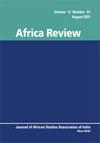History of Sub-Saharan Africa’s Long Journey towards Economic Emancipation
IF 0.5
Q4 AREA STUDIES
引用次数: 0
Abstract
The history of the African Growth and Opportunity Act (AGOA) i.e., the trade partnership between the US and sub-Saharan African states indicates that the initial Clinton Administration blueprint for this venture was to operate for eight years, from 2000 to 2008. However, in 2004 George Bush, the incoming US president, pushed the AGOA mandate to 2015. Before the AGOA order could expire, its mandate was again extended to 2025 by then US president Barack Obama. This study argues that the lofty ambitions inscribed in the design of AGOA seem not to have lived up to their billing. The study finds that the theoretical win-win proposition that was envisioned does not appear to have yielded the desired economic results for sub-Saharan states mainly because the enterprise is likely a one-sided trade deal in favour of the US. Data for this study was gathered from qualitative and quantitative sources. The study concludes that given the pattern of the US engagements with sub-Saharan Africa, which seems only focused on advancing US national interests, the sub-Saharan region needs to devise alternative trade partnerships if its economy is to grow. The study recommends that sub-Saharan Africa focuses on intra-Africa trade. Alternatively, it should strengthen development cooperation with emerging markets such as the BRICS (Brazil, Russia, India, China, and South Africa).撒哈拉以南非洲走向经济解放的漫长历程
《非洲增长与机遇法案》(AGOA),即美国与撒哈拉以南非洲国家之间的贸易伙伴关系的历史表明,克林顿政府最初的蓝图是在2000年至2008年期间实施这一项目。然而,2004年,即将上任的美国总统乔治•布什(George Bush)将《非洲增长与机会法》的授权期限推迟到了2015年。在《非洲增长与机会法》命令到期之前,时任美国总统巴拉克•奥巴马(Barack Obama)再次将其授权期限延长至2025年。这项研究认为,《非洲增长与机会法》设计中所写的崇高抱负似乎并没有兑现。研究发现,设想的理论上的双赢主张似乎并未为撒哈拉以南国家带来预期的经济结果,主要原因是该企业可能是一项有利于美国的单方面贸易协议。本研究的数据来自定性和定量来源。该研究得出的结论是,鉴于美国与撒哈拉以南非洲地区的交往模式似乎只关注于促进美国的国家利益,撒哈拉以南地区如果要实现经济增长,就需要设计出替代的贸易伙伴关系。该研究建议撒哈拉以南非洲将重点放在非洲内部贸易上。或者,应加强与金砖国家(巴西、俄罗斯、印度、中国和南非)等新兴市场的发展合作。
本文章由计算机程序翻译,如有差异,请以英文原文为准。
求助全文
约1分钟内获得全文
求助全文
来源期刊

Africa Review
AREA STUDIES-
CiteScore
1.80
自引率
12.50%
发文量
22
期刊介绍:
Africa Review is an interdisciplinary academic journal of the African Studies Association of India (ASA India) and focuses on theoretical, historical, literary and developmental enquiries related to African affairs. The central aim of the journal is to promote a scholarly understanding of developments and change in Africa, publishing both original scholarship on developments in individual countries as well as comparative analyses examining the wider region. The journal serves the full spectrum of social science disciplinary communities, including anthropology, archaeology, history, law, sociology, demography, development studies, economics, education, gender studies, industrial relations, literature, politics and urban studies.
 求助内容:
求助内容: 应助结果提醒方式:
应助结果提醒方式:


